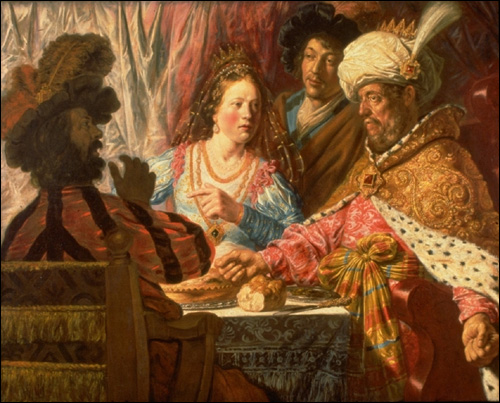I just had the privilege of reading Aaron Koller’s new book on Esther which came out just a few weeks before mine (Esther and Her Elusive God). I would have liked to engage him in my book, but this brief review will have to suffice (for now).
Aaron Koller, who is Associate Professor of Near Eastern and Jewish Studies at Yeshiva University in New York City, is the author of a new book on Esther, entitled, Esther in Ancient Jewish Thought, published by Cambridge University Press (2014). Let me just begin by saying that reading a book on a subject that you’ve just recently written a book on yourself is an interesting exercise! It was fun to experience that for the first time.
Koller’s thesis is stated clearly at the start—”Esther, first and foremost, is a work of politics” (p. 1). For Koller, the author of Esther—whom he has chosen to call “Marduka”—wrote Esther in order to subvert the received wisdom of the day. He was dismantling the linguistic, geographic, ethnic, genealogical, historiosophical, and political components of broader Jewish thought—especially that Jewish thought that was not popular in the eastern diaspora (pp. 30–34). “Marduka” was therefore trying to dismantle “the Hebrew-Jerusalem-David-endogamy-Exodus-God complex” of other Jews (p. 34).
Perhaps the central political emphasis that Koller sees in the story of Esther is an “anti-David” position. “Marduka” no longer believed the prophetic expectations of a Davidide sitting on the throne in Jerusalem. So the story of Esther and Mordecai—two Benjaminites who descended from King Saul—was precisely meant to critique the pro-David position and prophecies. In my book, however, I contend that the associations with Saul are meant to recall his blunders and failures (see pp. 17–20, 35–40, 56–60 in Esther and Her Elusive God). Koller anticipates this sort of objection and comments on p. 51, “Marduka knew well that proponents of the Davidides could easily point out that Saul, the original Israelite king from Benjamin, had been a fatally flawed character. In formulating his hero, therefore, Marduka would make sure that they – and in particular, Esther – corrected all of the flaws inherent in their predecessor.” This line of thinking in Esther becomes directly connected to the story in 1 Samuel 15 where the conflict between King Saul and King Agag is now transposed between Mordecai the descendent of Saul and Haman “the Agagite.” The problem in 1 Samuel 15 was that Saul did not completely destroy Agag and his property, as the Lord commanded, but instead he kept Agag alive and took some of his possessions. This scene is ultimately what cost Saul his royal position; Saul’s chief blunder was taking the plunder. During the final battles in Esther 9 we read of the Jews not taking plunder (9:10, 15–16), and so many scholars, Koller included (pp.86–89), see the undoing of Saul’s flaws here. However, as I argue in my book on pp. 56–60, this is actually not the case. Esther 8:1–2, 7 states that Esther and Mordecai received the estate of Haman (i.e. all his property, i.e. the plunder). So tragically Esther and Mordecai do not redeem the failures of Saul but repeat them!
Koller is emphatic as to the “secular” and “assimilated” nature of the Esther story. For instance, Koller can say about Esther, “She resists nothing: not foreign food, not foreign bodies, not foreign culture” (p. 68). Indeed, Part 3 of Koller’s book demonstrates how the earliest readers of Esther responded so negatively to it. He suggests, as I do, that the Greek Additions to Esther reflect an effort to correct and convert the story. However, Koller and I offer different explanations as to why the story is so seemingly secular. For Koller it is because the author of Esther was subverting the mainstream religious positions of those in the land of Palestine, and because he himself has given up believing in God—”Life has been desacralized. There is no God, there are no miracles” (p. 93). So even though Koller admits that Esther as a character breaks several Jewish customs and laws, the author does not have a problem with this and thus Esther and Mordecai are “positive figures” even though they are “Persianized.” In my book I argue instead that the absence of God is part of the theme of exile and thus God’s “absence” is meant to amplify the secular nature of the characters (thus I distinguish the perspectives of the author from the outlook of the characters). For instance, it is the author who lets the reader know that Haman’s decree to kill the all the Jews is given just before the start of the Passover celebration (Esther 3:12), and thus the author is not disparaging the Passover festival and the tradition surrounding the God of the Exodus, but is highlighting the lack of trust and confidence in God in this dark hour (see my exegesis of Esther 4 on pp. 40–56). Indeed, the reuse of Joel 2 in ch. 4—something Koller never mentions—is suggestive because of the fact that a key theme in Joel 2 is missing in Esther 4—repentance. The author’s subtlety is also at work in chapter 6 where the Persian king is unable to sleep. This “coincidence” is highly suggestive. The characters aren’t aware of it, and they are oblivious. But the author narrates the scene in a fashion that points towards God’s providential guidance. The overall effect of the Esther narrative then is that divine absence was part of the covenantal curses that resulted from Israel’s disobedience. However, even in such a position the elusive God of Esther would not forget his covenantal promises to Abraham and David—hence the ironic comment of Zeresh, Haman’s wife, regarding the Jewish “seed” in Esther 6:13 (cf. Gen 12:1–3; 2 Sam 7)—and would be faithful even to his unfaithful people.
Despite my different reading of Esther, I thoroughly enjoyed Koller’s Esther in Ancient Jewish Thought. Several of his suggestions are intriguing and insightful, and his detailed research is impressive. I highly recommend this book for seriously interested students and scholars (it has a lot of Hebrew and all of his dialogue partners are academics). If you’re doing any kind of serious work on Esther, you must reckon with this fantastic book.





2 Comments
Leave your reply.